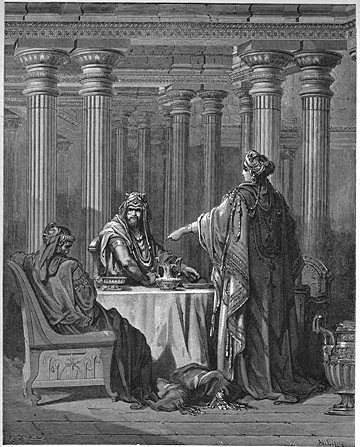Ester 7
1 Ale Haman kple Fia Ahasuerus va kplɔ̃ si Ester ɖo la ŋu.
So the king and Haman came in, to banquet with Esther the queen.
2 Fia la gabia Ester esi wonɔ wain nom la be, “Nu kae nèdi be yeabia, Fianyɔnu Ester? Nu ka nèdi? Nu sia nu si wòanye la, matsɔe na wò, ne anye nye fiaɖuƒe la ƒe afãe gɔ̃ hã la, mana wò!”
Then said the king unto Esther, on the second day also, during the banquet of wine, What is thy petition, Queen Esther, that it may be granted thee? and what is thy request—unto the half of the kingdom—that it may be performed?
3 Fianyɔnu Ester ɖo eŋu azɔ be, “Nenye be nye nu nyo ŋuwò, O! Fia bubutɔ, ne edze ŋuwò la, ɖe nye agbe. Esiae nye nye kukuɖeɖe, eye nàve nye amewo, Yudatɔwo hã nu. Esiae nye nye biabia,
Then answered Esther the queen, and said, If I have found favour in thine eyes, O king, and if, unto the king, it seem good, let my life be granted me, as my petition, and my people, as my request;
4 elabena wotsɔ nye kple nye amewo dzra be woagbã mi, woawu mí, eye woatsrɔ̃ mi, gake ne woadzra mí míazu kluviwo kple kosiviwo ɖeɖe ko la, anye ne mazi ɖoɖoe, gake nunana si ŋugbe futɔ la do la, made nu gbogbo siwo fia la abu la nu o.”
For we are sold, I and my people, to be destroyed, to be slain and to be caused to perish. If indeed, for bondmen and for bondwomen, we had been sold, I had held my peace, although the adversary could not have made good the damage to the king.
5 Fia Ahasuerus bia Fiasrɔ̃ Ester be, “Ame kae? Afi ka ŋutsu si dɔ eɖokui be yeawɔ nu sia la le?”
Then spake King Ahasuerus, and said unto Esther the queen, —Who is he now, and where is he, whose heart is set to act thus?
6 Ester ɖo eŋu be, “Míaƒe futɔ kple ketɔ lae nye Haman vɔ̃ɖi sia.” Tete vɔvɔ̃ na Haman ɖi vo, eye eƒe mo da tu le fia la kple fiasrɔ̃ la ƒe ŋkume.
And Esther said, A man who is an adversary and enemy, this wicked Haman. And, Haman, was terrified, before the king and the queen.
7 Fia la tsi tsitre enumake kple dziku le eƒe wain gbɔ, eye wòyi fiasã la ƒe abɔ me. Esi Haman kpɔ be fia la ɖo nugbe ɖe ye ŋu xoxo la, etsi kplɔ̃a ŋu be yeaɖe kuku na Fiasrɔ̃ Ester ɖe yeƒe agbe ta.
Now, the king, arising in his wrath from the banquet of wine, and going into the palace garden, Haman, stood to make request for his life from Esther the queen, for he saw that ruin, was determined against him, by the king.
8 Esi fia la trɔ gbɔ tso fiasã la ƒe abɔ me hege ɖe kplɔ̃ɖoƒe la ko la, ekpɔ Haman wòmu dze Fiasrɔ̃ Ester dzi le zikpui legbe si dzi wòdze ŋe ɖo la dzi. Fia la blu be, “Aa! Ɖe wòle asi de ge fiasrɔ̃ la ŋu esi wòli kplim le nye aƒe mea?” Fia la mekpɔ wu nuƒo la nu hafi wova tsɔ nu tsyɔ mo na Haman o.
When, the king, returned out of the palace garden into the place of the banquet of wine, Haman, was lying prostrate upon the couch whereon Esther was. Then said the king, Will he, even dare to force the queen, while I am in the house? No sooner had the word gone forth out of the mouth of the king, than, the face of Haman, they had covered.
9 Harbona, fia la ƒe subɔlawo dometɔ ɖeka gblɔ be, “Fia bubutɔ, Haman na wotu kadeveti aɖe si kɔ mita blaeve-vɔ-etɔ̃ la ɖe Mordekai, ame si ɖe fia la ƒe agbe la ŋu, ele Haman ƒe aƒe ƒe xɔxɔnu.” Fia la ɖe gbe be, “Mide ka ve na Haman ɖe kadeveti la ŋu!”
Then said Harbonah—one of the eunuchs before the king—Yea lo! the gallows that Haman made ready for Mordecai, who had spoken well for the king, is standing in Haman’s house, of a height of fifty cubits. Then said the king, Hang him thereon.
10 Ale wode ka ve nɛ ɖe kadeveti si wòtu na Mordekai la ŋu, eye fia la ƒe dziku nu fa.
So they hanged Haman on the gallows which he had prepared for Mordecai, —and, the wrath of the king, was appeased.





















